Investigating the Impact of Refined Carbohydrates on Gut Microbiota
VerifiedAdded on 2023/01/16
|14
|3115
|39
Report
AI Summary
This research proposal investigates the impact of refined carbohydrates on human gut microbiota. The study aims to identify and evaluate the effects of refined carbohydrate consumption on the composition and functioning of the gut microbiome, including physiological, metabolic, and immunological implications. It explores the research background, rationale, aims, objectives, and research questions, along with a literature review on the role of gut microbiota and the impact of refined carbohydrates. The methodology includes a qualitative research design using a systematic review, data collection via electronic databases, and thematic analysis. Ethical considerations and research limitations are also addressed, along with a Gantt chart outlining the research timeline. The expected outcome is to provide insights into the effects of refined carbohydrate consumption on gut microbiota and its implications for health and nutritional status. The proposal emphasizes the importance of understanding the relationship between diet and gut health for improved health promotion and disease prevention.
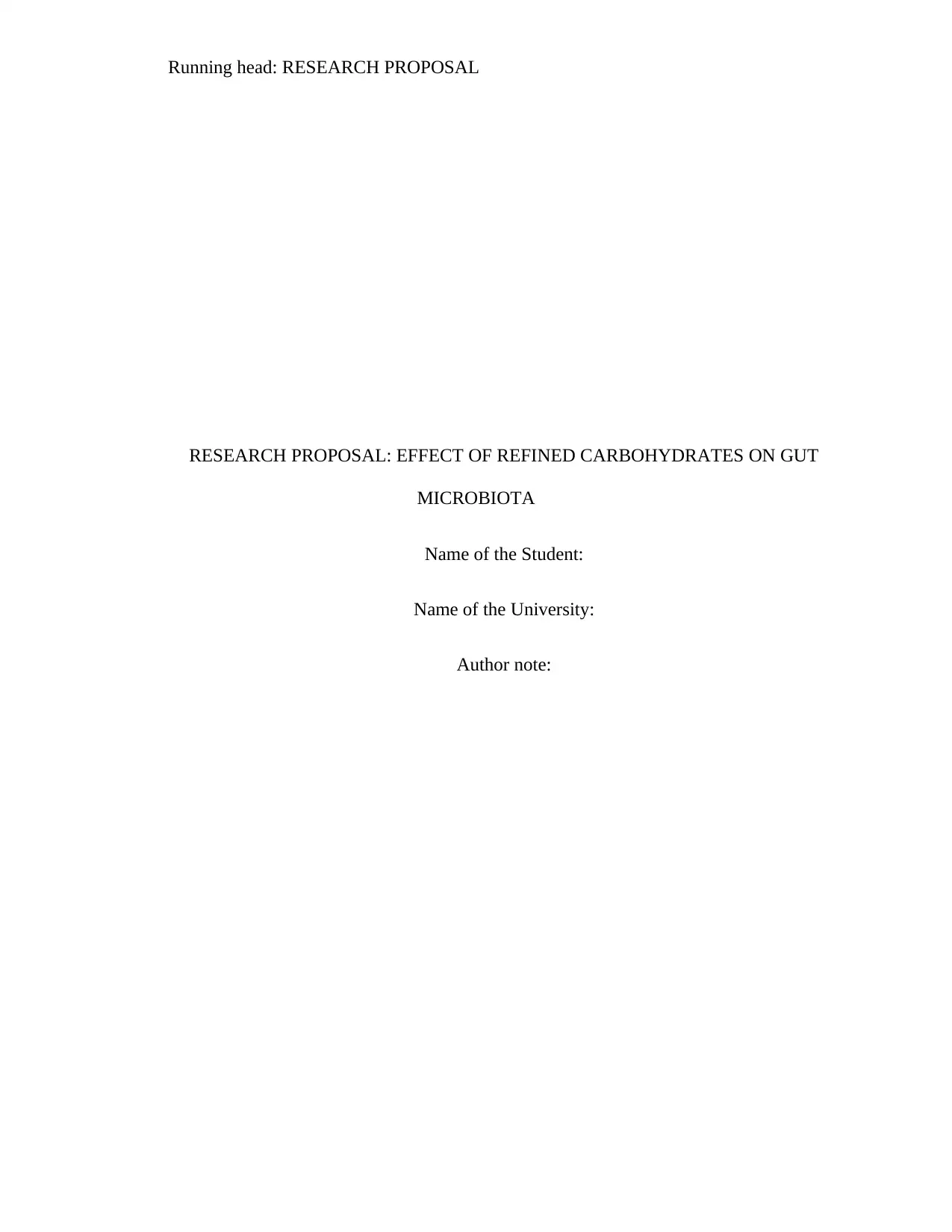
Running head: RESEARCH PROPOSAL
RESEARCH PROPOSAL: EFFECT OF REFINED CARBOHYDRATES ON GUT
MICROBIOTA
Name of the Student:
Name of the University:
Author note:
RESEARCH PROPOSAL: EFFECT OF REFINED CARBOHYDRATES ON GUT
MICROBIOTA
Name of the Student:
Name of the University:
Author note:
Paraphrase This Document
Need a fresh take? Get an instant paraphrase of this document with our AI Paraphraser
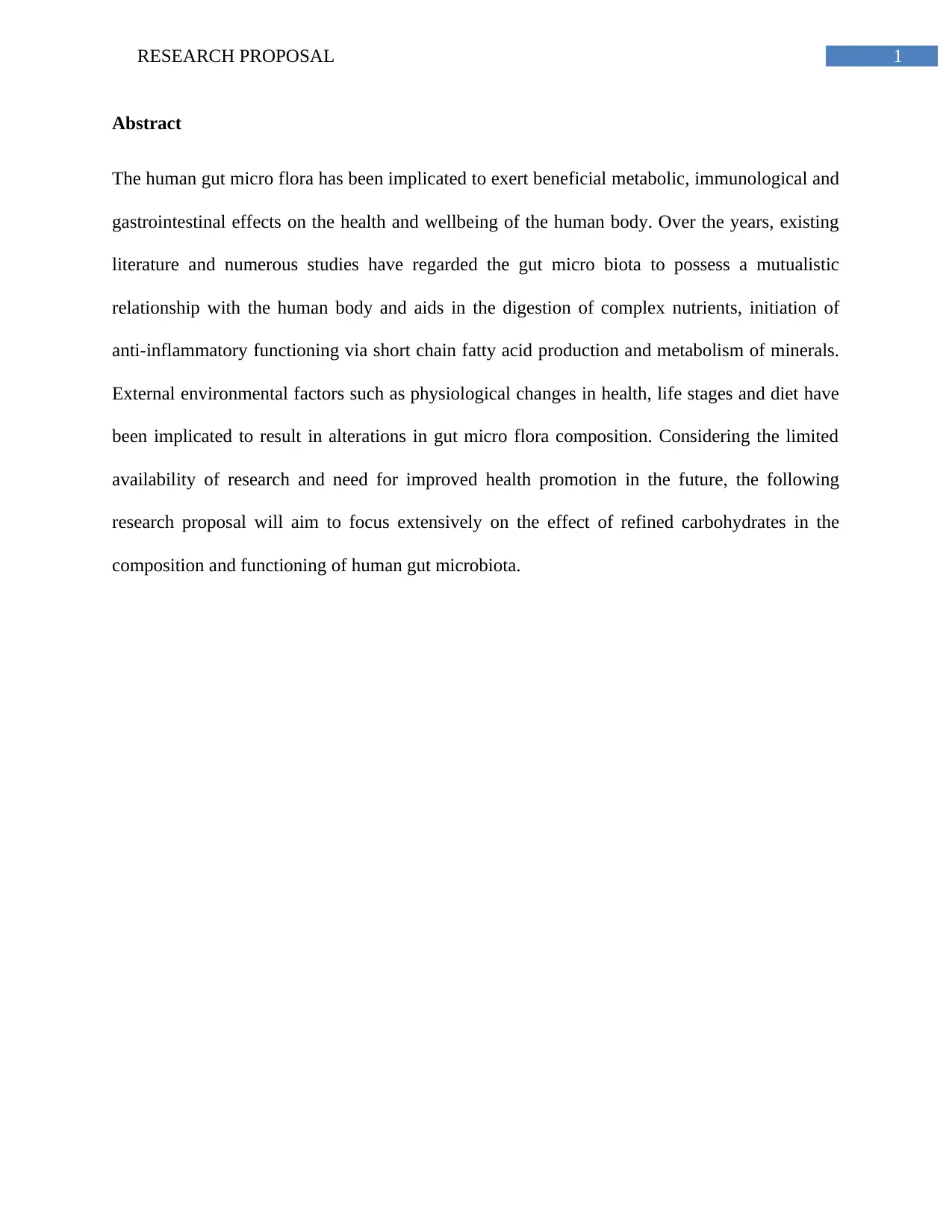
1RESEARCH PROPOSAL
Abstract
The human gut micro flora has been implicated to exert beneficial metabolic, immunological and
gastrointestinal effects on the health and wellbeing of the human body. Over the years, existing
literature and numerous studies have regarded the gut micro biota to possess a mutualistic
relationship with the human body and aids in the digestion of complex nutrients, initiation of
anti-inflammatory functioning via short chain fatty acid production and metabolism of minerals.
External environmental factors such as physiological changes in health, life stages and diet have
been implicated to result in alterations in gut micro flora composition. Considering the limited
availability of research and need for improved health promotion in the future, the following
research proposal will aim to focus extensively on the effect of refined carbohydrates in the
composition and functioning of human gut microbiota.
Abstract
The human gut micro flora has been implicated to exert beneficial metabolic, immunological and
gastrointestinal effects on the health and wellbeing of the human body. Over the years, existing
literature and numerous studies have regarded the gut micro biota to possess a mutualistic
relationship with the human body and aids in the digestion of complex nutrients, initiation of
anti-inflammatory functioning via short chain fatty acid production and metabolism of minerals.
External environmental factors such as physiological changes in health, life stages and diet have
been implicated to result in alterations in gut micro flora composition. Considering the limited
availability of research and need for improved health promotion in the future, the following
research proposal will aim to focus extensively on the effect of refined carbohydrates in the
composition and functioning of human gut microbiota.
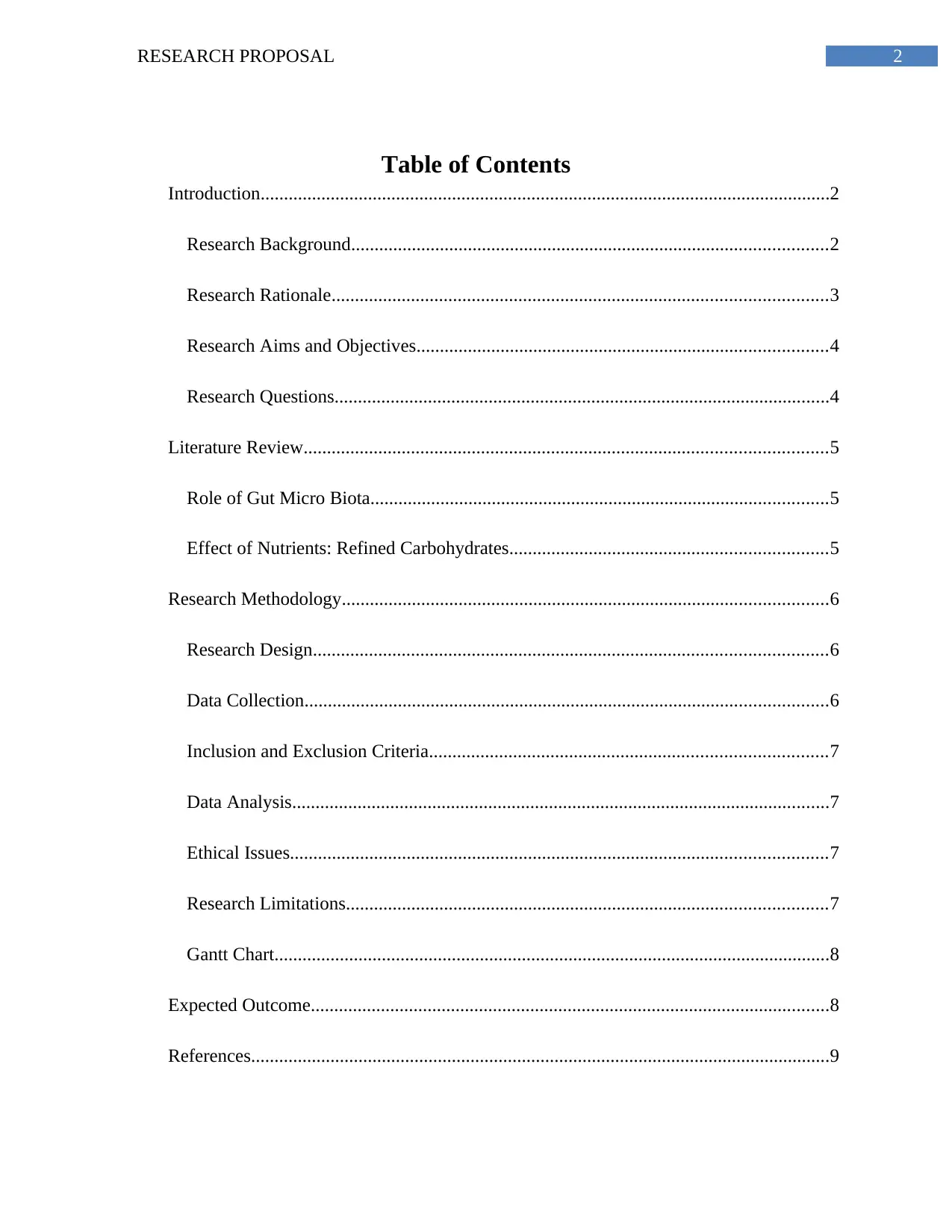
2RESEARCH PROPOSAL
Table of Contents
Introduction..........................................................................................................................2
Research Background......................................................................................................2
Research Rationale..........................................................................................................3
Research Aims and Objectives........................................................................................4
Research Questions..........................................................................................................4
Literature Review................................................................................................................5
Role of Gut Micro Biota..................................................................................................5
Effect of Nutrients: Refined Carbohydrates....................................................................5
Research Methodology........................................................................................................6
Research Design..............................................................................................................6
Data Collection................................................................................................................6
Inclusion and Exclusion Criteria.....................................................................................7
Data Analysis...................................................................................................................7
Ethical Issues...................................................................................................................7
Research Limitations.......................................................................................................7
Gantt Chart.......................................................................................................................8
Expected Outcome...............................................................................................................8
References............................................................................................................................9
Table of Contents
Introduction..........................................................................................................................2
Research Background......................................................................................................2
Research Rationale..........................................................................................................3
Research Aims and Objectives........................................................................................4
Research Questions..........................................................................................................4
Literature Review................................................................................................................5
Role of Gut Micro Biota..................................................................................................5
Effect of Nutrients: Refined Carbohydrates....................................................................5
Research Methodology........................................................................................................6
Research Design..............................................................................................................6
Data Collection................................................................................................................6
Inclusion and Exclusion Criteria.....................................................................................7
Data Analysis...................................................................................................................7
Ethical Issues...................................................................................................................7
Research Limitations.......................................................................................................7
Gantt Chart.......................................................................................................................8
Expected Outcome...............................................................................................................8
References............................................................................................................................9
⊘ This is a preview!⊘
Do you want full access?
Subscribe today to unlock all pages.

Trusted by 1+ million students worldwide
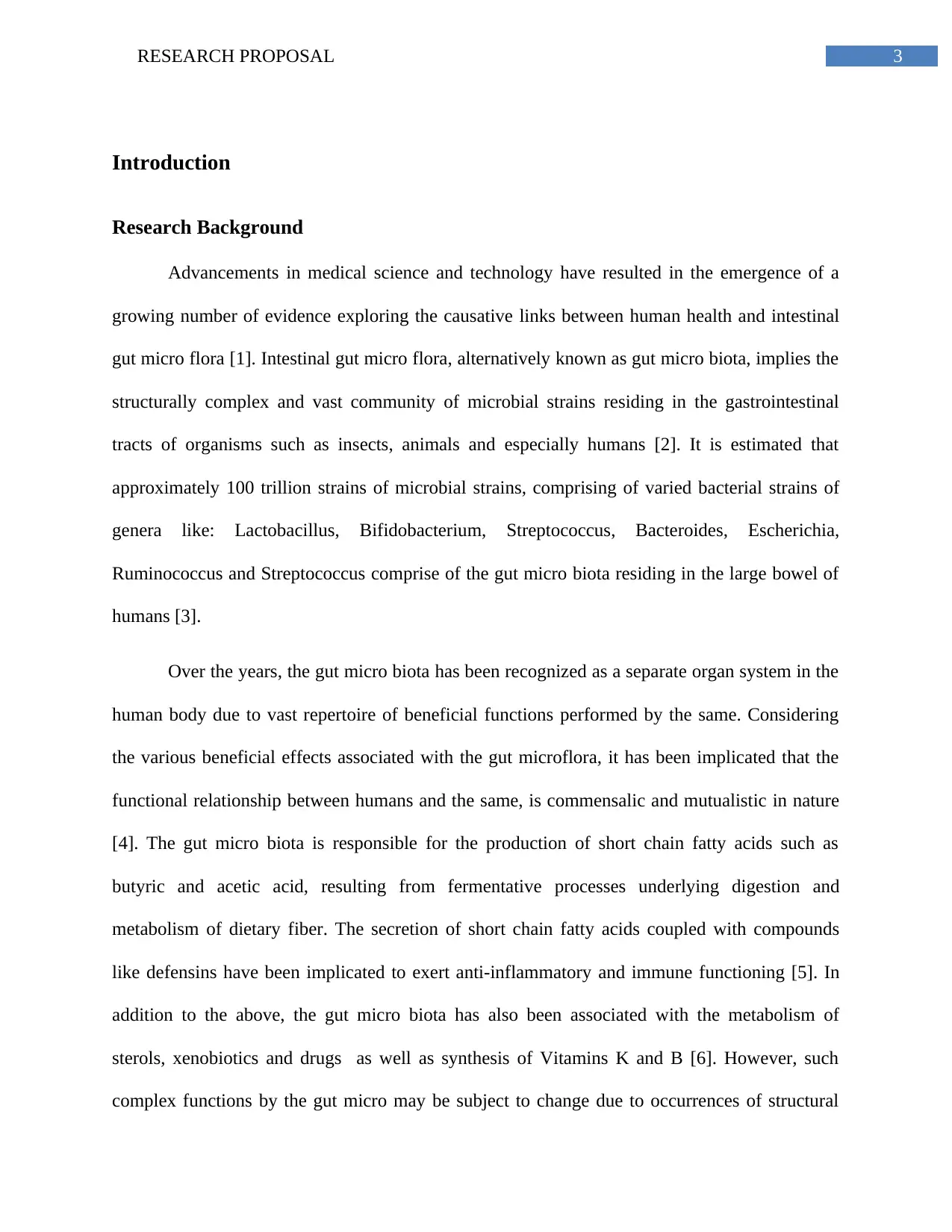
3RESEARCH PROPOSAL
Introduction
Research Background
Advancements in medical science and technology have resulted in the emergence of a
growing number of evidence exploring the causative links between human health and intestinal
gut micro flora [1]. Intestinal gut micro flora, alternatively known as gut micro biota, implies the
structurally complex and vast community of microbial strains residing in the gastrointestinal
tracts of organisms such as insects, animals and especially humans [2]. It is estimated that
approximately 100 trillion strains of microbial strains, comprising of varied bacterial strains of
genera like: Lactobacillus, Bifidobacterium, Streptococcus, Bacteroides, Escherichia,
Ruminococcus and Streptococcus comprise of the gut micro biota residing in the large bowel of
humans [3].
Over the years, the gut micro biota has been recognized as a separate organ system in the
human body due to vast repertoire of beneficial functions performed by the same. Considering
the various beneficial effects associated with the gut microflora, it has been implicated that the
functional relationship between humans and the same, is commensalic and mutualistic in nature
[4]. The gut micro biota is responsible for the production of short chain fatty acids such as
butyric and acetic acid, resulting from fermentative processes underlying digestion and
metabolism of dietary fiber. The secretion of short chain fatty acids coupled with compounds
like defensins have been implicated to exert anti-inflammatory and immune functioning [5]. In
addition to the above, the gut micro biota has also been associated with the metabolism of
sterols, xenobiotics and drugs as well as synthesis of Vitamins K and B [6]. However, such
complex functions by the gut micro may be subject to change due to occurrences of structural
Introduction
Research Background
Advancements in medical science and technology have resulted in the emergence of a
growing number of evidence exploring the causative links between human health and intestinal
gut micro flora [1]. Intestinal gut micro flora, alternatively known as gut micro biota, implies the
structurally complex and vast community of microbial strains residing in the gastrointestinal
tracts of organisms such as insects, animals and especially humans [2]. It is estimated that
approximately 100 trillion strains of microbial strains, comprising of varied bacterial strains of
genera like: Lactobacillus, Bifidobacterium, Streptococcus, Bacteroides, Escherichia,
Ruminococcus and Streptococcus comprise of the gut micro biota residing in the large bowel of
humans [3].
Over the years, the gut micro biota has been recognized as a separate organ system in the
human body due to vast repertoire of beneficial functions performed by the same. Considering
the various beneficial effects associated with the gut microflora, it has been implicated that the
functional relationship between humans and the same, is commensalic and mutualistic in nature
[4]. The gut micro biota is responsible for the production of short chain fatty acids such as
butyric and acetic acid, resulting from fermentative processes underlying digestion and
metabolism of dietary fiber. The secretion of short chain fatty acids coupled with compounds
like defensins have been implicated to exert anti-inflammatory and immune functioning [5]. In
addition to the above, the gut micro biota has also been associated with the metabolism of
sterols, xenobiotics and drugs as well as synthesis of Vitamins K and B [6]. However, such
complex functions by the gut micro may be subject to change due to occurrences of structural
Paraphrase This Document
Need a fresh take? Get an instant paraphrase of this document with our AI Paraphraser
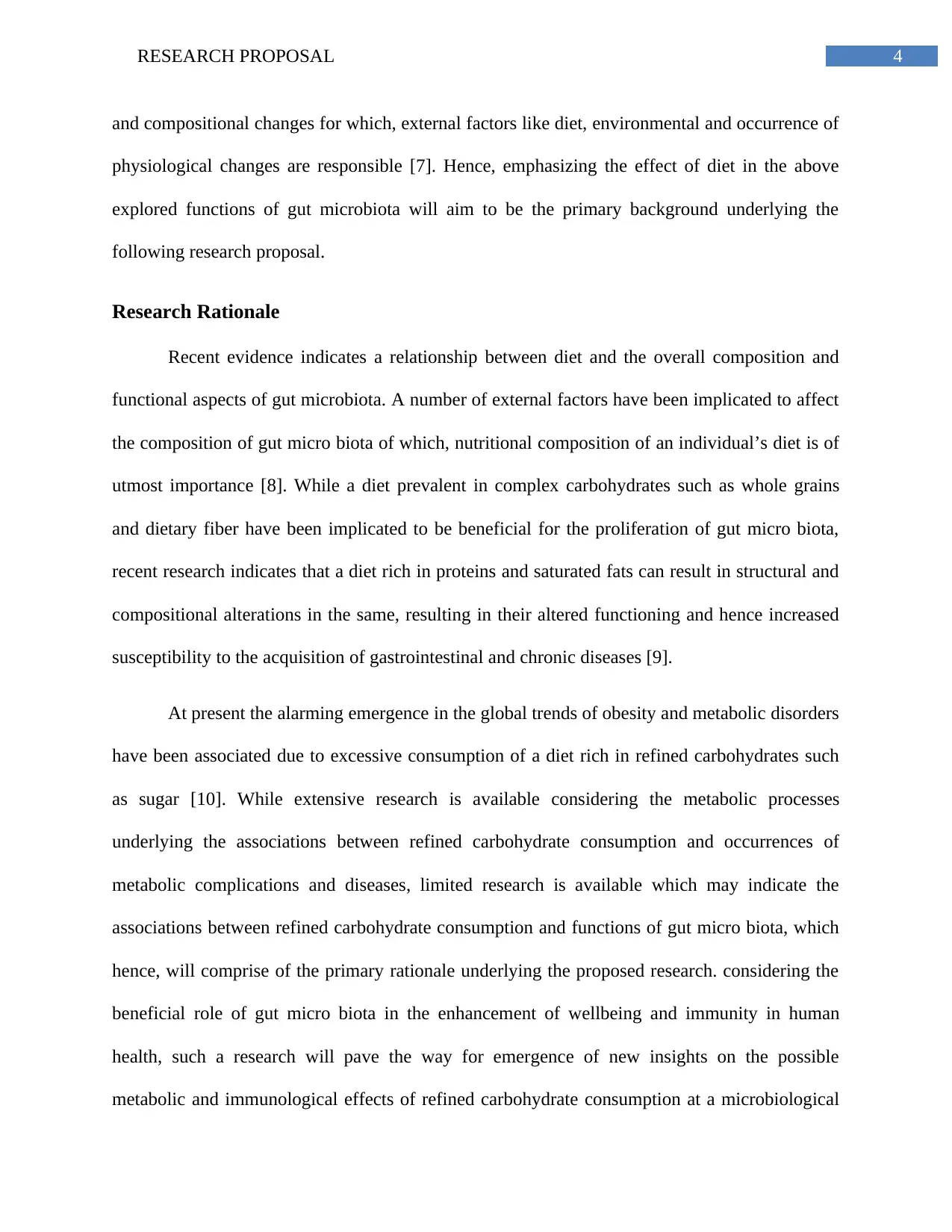
4RESEARCH PROPOSAL
and compositional changes for which, external factors like diet, environmental and occurrence of
physiological changes are responsible [7]. Hence, emphasizing the effect of diet in the above
explored functions of gut microbiota will aim to be the primary background underlying the
following research proposal.
Research Rationale
Recent evidence indicates a relationship between diet and the overall composition and
functional aspects of gut microbiota. A number of external factors have been implicated to affect
the composition of gut micro biota of which, nutritional composition of an individual’s diet is of
utmost importance [8]. While a diet prevalent in complex carbohydrates such as whole grains
and dietary fiber have been implicated to be beneficial for the proliferation of gut micro biota,
recent research indicates that a diet rich in proteins and saturated fats can result in structural and
compositional alterations in the same, resulting in their altered functioning and hence increased
susceptibility to the acquisition of gastrointestinal and chronic diseases [9].
At present the alarming emergence in the global trends of obesity and metabolic disorders
have been associated due to excessive consumption of a diet rich in refined carbohydrates such
as sugar [10]. While extensive research is available considering the metabolic processes
underlying the associations between refined carbohydrate consumption and occurrences of
metabolic complications and diseases, limited research is available which may indicate the
associations between refined carbohydrate consumption and functions of gut micro biota, which
hence, will comprise of the primary rationale underlying the proposed research. considering the
beneficial role of gut micro biota in the enhancement of wellbeing and immunity in human
health, such a research will pave the way for emergence of new insights on the possible
metabolic and immunological effects of refined carbohydrate consumption at a microbiological
and compositional changes for which, external factors like diet, environmental and occurrence of
physiological changes are responsible [7]. Hence, emphasizing the effect of diet in the above
explored functions of gut microbiota will aim to be the primary background underlying the
following research proposal.
Research Rationale
Recent evidence indicates a relationship between diet and the overall composition and
functional aspects of gut microbiota. A number of external factors have been implicated to affect
the composition of gut micro biota of which, nutritional composition of an individual’s diet is of
utmost importance [8]. While a diet prevalent in complex carbohydrates such as whole grains
and dietary fiber have been implicated to be beneficial for the proliferation of gut micro biota,
recent research indicates that a diet rich in proteins and saturated fats can result in structural and
compositional alterations in the same, resulting in their altered functioning and hence increased
susceptibility to the acquisition of gastrointestinal and chronic diseases [9].
At present the alarming emergence in the global trends of obesity and metabolic disorders
have been associated due to excessive consumption of a diet rich in refined carbohydrates such
as sugar [10]. While extensive research is available considering the metabolic processes
underlying the associations between refined carbohydrate consumption and occurrences of
metabolic complications and diseases, limited research is available which may indicate the
associations between refined carbohydrate consumption and functions of gut micro biota, which
hence, will comprise of the primary rationale underlying the proposed research. considering the
beneficial role of gut micro biota in the enhancement of wellbeing and immunity in human
health, such a research will pave the way for emergence of new insights on the possible
metabolic and immunological effects of refined carbohydrate consumption at a microbiological
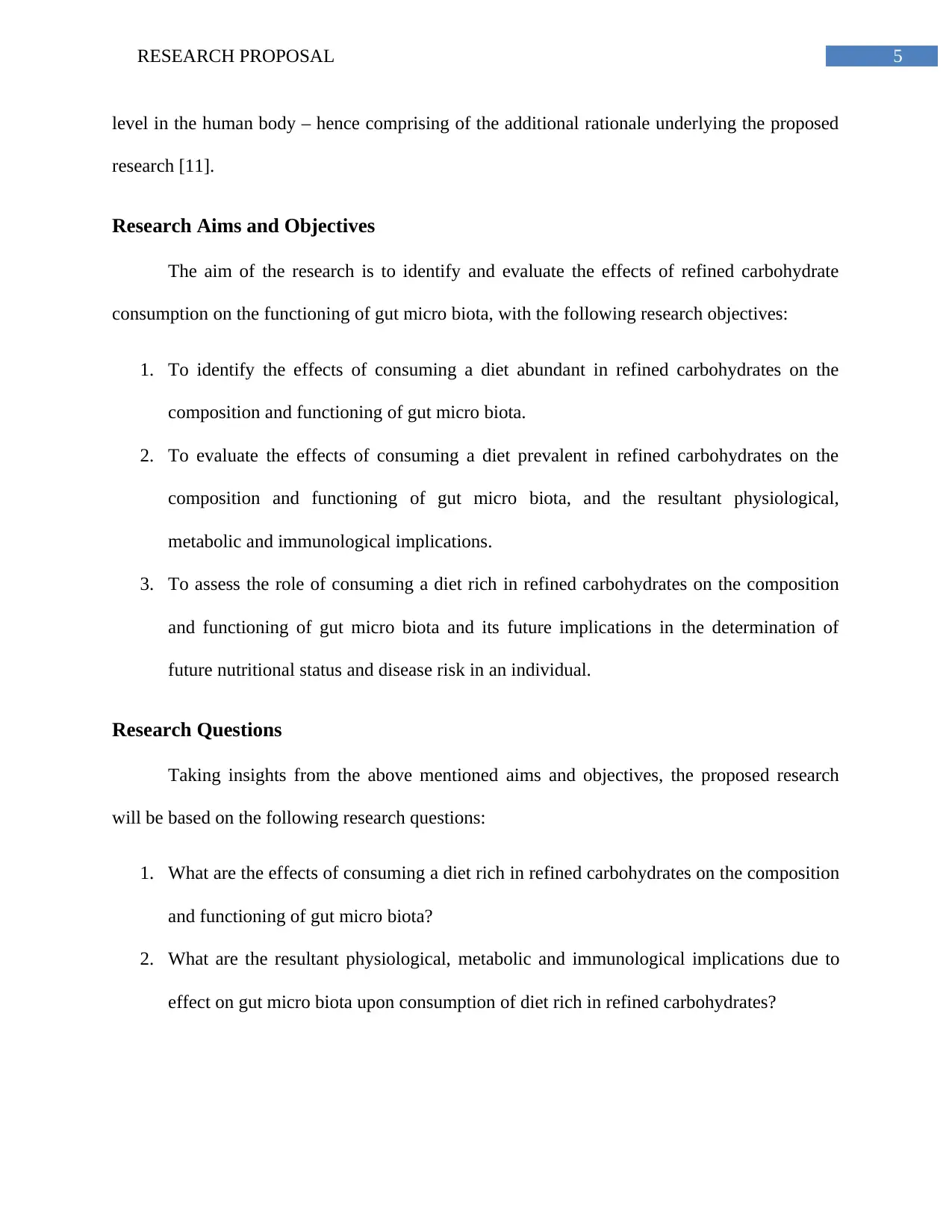
5RESEARCH PROPOSAL
level in the human body – hence comprising of the additional rationale underlying the proposed
research [11].
Research Aims and Objectives
The aim of the research is to identify and evaluate the effects of refined carbohydrate
consumption on the functioning of gut micro biota, with the following research objectives:
1. To identify the effects of consuming a diet abundant in refined carbohydrates on the
composition and functioning of gut micro biota.
2. To evaluate the effects of consuming a diet prevalent in refined carbohydrates on the
composition and functioning of gut micro biota, and the resultant physiological,
metabolic and immunological implications.
3. To assess the role of consuming a diet rich in refined carbohydrates on the composition
and functioning of gut micro biota and its future implications in the determination of
future nutritional status and disease risk in an individual.
Research Questions
Taking insights from the above mentioned aims and objectives, the proposed research
will be based on the following research questions:
1. What are the effects of consuming a diet rich in refined carbohydrates on the composition
and functioning of gut micro biota?
2. What are the resultant physiological, metabolic and immunological implications due to
effect on gut micro biota upon consumption of diet rich in refined carbohydrates?
level in the human body – hence comprising of the additional rationale underlying the proposed
research [11].
Research Aims and Objectives
The aim of the research is to identify and evaluate the effects of refined carbohydrate
consumption on the functioning of gut micro biota, with the following research objectives:
1. To identify the effects of consuming a diet abundant in refined carbohydrates on the
composition and functioning of gut micro biota.
2. To evaluate the effects of consuming a diet prevalent in refined carbohydrates on the
composition and functioning of gut micro biota, and the resultant physiological,
metabolic and immunological implications.
3. To assess the role of consuming a diet rich in refined carbohydrates on the composition
and functioning of gut micro biota and its future implications in the determination of
future nutritional status and disease risk in an individual.
Research Questions
Taking insights from the above mentioned aims and objectives, the proposed research
will be based on the following research questions:
1. What are the effects of consuming a diet rich in refined carbohydrates on the composition
and functioning of gut micro biota?
2. What are the resultant physiological, metabolic and immunological implications due to
effect on gut micro biota upon consumption of diet rich in refined carbohydrates?
⊘ This is a preview!⊘
Do you want full access?
Subscribe today to unlock all pages.

Trusted by 1+ million students worldwide
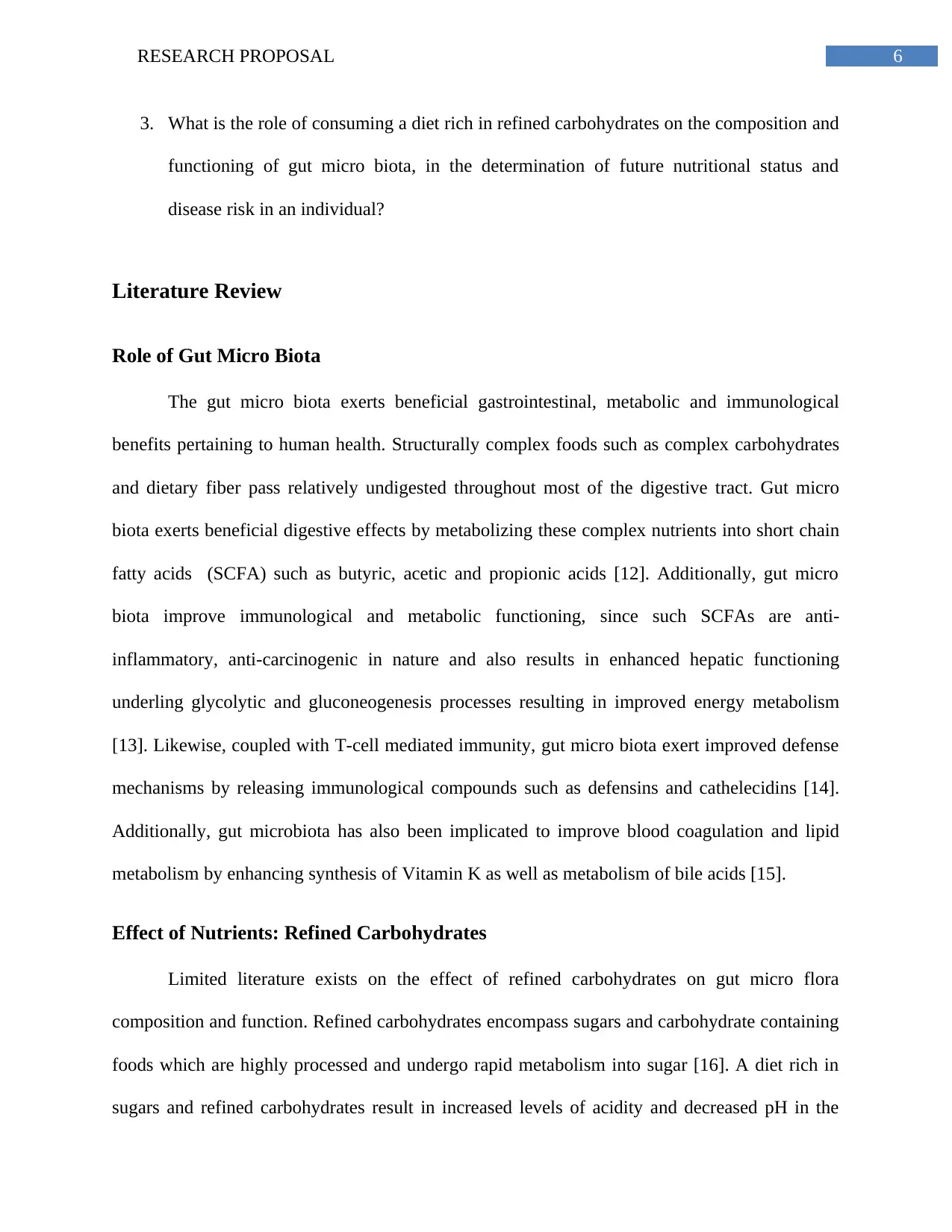
6RESEARCH PROPOSAL
3. What is the role of consuming a diet rich in refined carbohydrates on the composition and
functioning of gut micro biota, in the determination of future nutritional status and
disease risk in an individual?
Literature Review
Role of Gut Micro Biota
The gut micro biota exerts beneficial gastrointestinal, metabolic and immunological
benefits pertaining to human health. Structurally complex foods such as complex carbohydrates
and dietary fiber pass relatively undigested throughout most of the digestive tract. Gut micro
biota exerts beneficial digestive effects by metabolizing these complex nutrients into short chain
fatty acids (SCFA) such as butyric, acetic and propionic acids [12]. Additionally, gut micro
biota improve immunological and metabolic functioning, since such SCFAs are anti-
inflammatory, anti-carcinogenic in nature and also results in enhanced hepatic functioning
underling glycolytic and gluconeogenesis processes resulting in improved energy metabolism
[13]. Likewise, coupled with T-cell mediated immunity, gut micro biota exert improved defense
mechanisms by releasing immunological compounds such as defensins and cathelecidins [14].
Additionally, gut microbiota has also been implicated to improve blood coagulation and lipid
metabolism by enhancing synthesis of Vitamin K as well as metabolism of bile acids [15].
Effect of Nutrients: Refined Carbohydrates
Limited literature exists on the effect of refined carbohydrates on gut micro flora
composition and function. Refined carbohydrates encompass sugars and carbohydrate containing
foods which are highly processed and undergo rapid metabolism into sugar [16]. A diet rich in
sugars and refined carbohydrates result in increased levels of acidity and decreased pH in the
3. What is the role of consuming a diet rich in refined carbohydrates on the composition and
functioning of gut micro biota, in the determination of future nutritional status and
disease risk in an individual?
Literature Review
Role of Gut Micro Biota
The gut micro biota exerts beneficial gastrointestinal, metabolic and immunological
benefits pertaining to human health. Structurally complex foods such as complex carbohydrates
and dietary fiber pass relatively undigested throughout most of the digestive tract. Gut micro
biota exerts beneficial digestive effects by metabolizing these complex nutrients into short chain
fatty acids (SCFA) such as butyric, acetic and propionic acids [12]. Additionally, gut micro
biota improve immunological and metabolic functioning, since such SCFAs are anti-
inflammatory, anti-carcinogenic in nature and also results in enhanced hepatic functioning
underling glycolytic and gluconeogenesis processes resulting in improved energy metabolism
[13]. Likewise, coupled with T-cell mediated immunity, gut micro biota exert improved defense
mechanisms by releasing immunological compounds such as defensins and cathelecidins [14].
Additionally, gut microbiota has also been implicated to improve blood coagulation and lipid
metabolism by enhancing synthesis of Vitamin K as well as metabolism of bile acids [15].
Effect of Nutrients: Refined Carbohydrates
Limited literature exists on the effect of refined carbohydrates on gut micro flora
composition and function. Refined carbohydrates encompass sugars and carbohydrate containing
foods which are highly processed and undergo rapid metabolism into sugar [16]. A diet rich in
sugars and refined carbohydrates result in increased levels of acidity and decreased pH in the
Paraphrase This Document
Need a fresh take? Get an instant paraphrase of this document with our AI Paraphraser
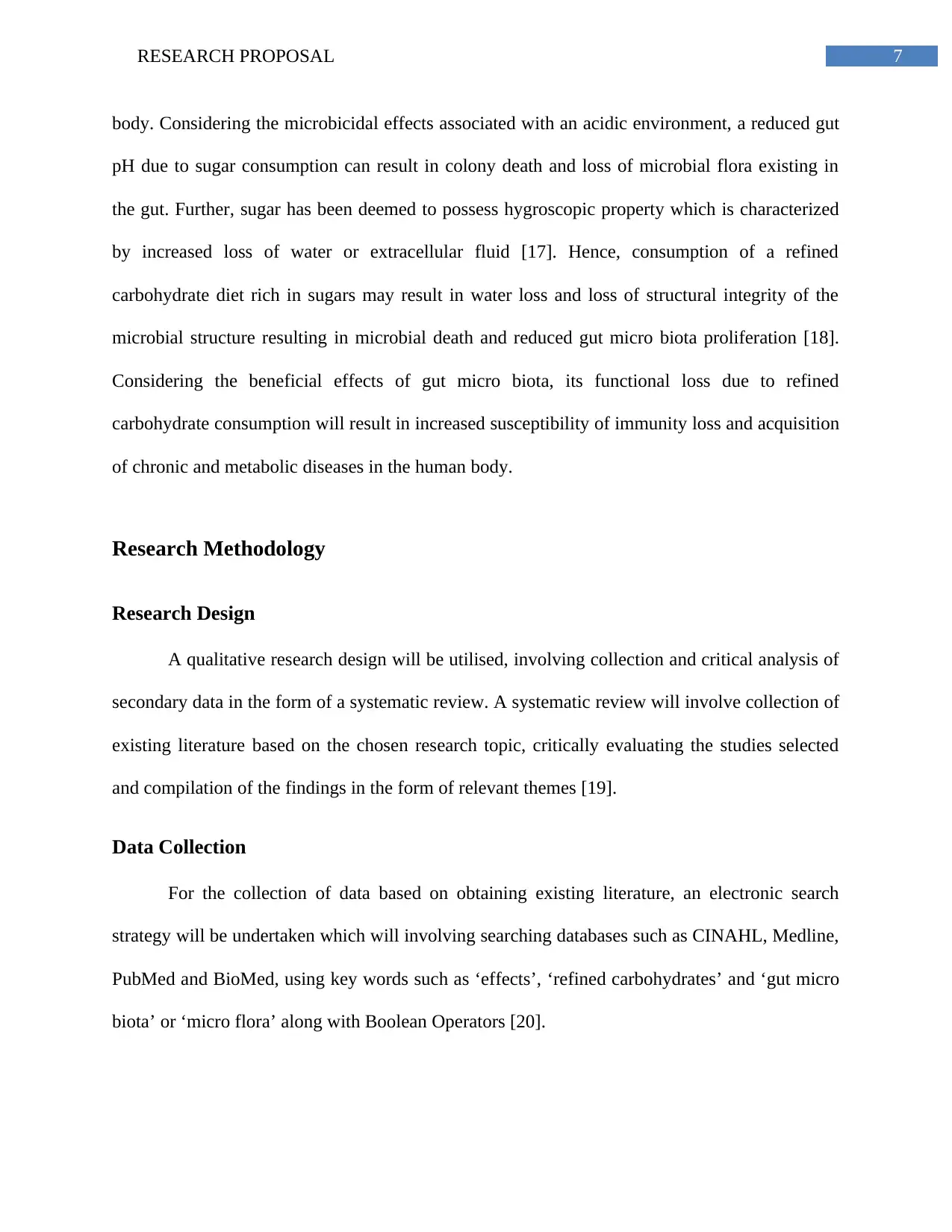
7RESEARCH PROPOSAL
body. Considering the microbicidal effects associated with an acidic environment, a reduced gut
pH due to sugar consumption can result in colony death and loss of microbial flora existing in
the gut. Further, sugar has been deemed to possess hygroscopic property which is characterized
by increased loss of water or extracellular fluid [17]. Hence, consumption of a refined
carbohydrate diet rich in sugars may result in water loss and loss of structural integrity of the
microbial structure resulting in microbial death and reduced gut micro biota proliferation [18].
Considering the beneficial effects of gut micro biota, its functional loss due to refined
carbohydrate consumption will result in increased susceptibility of immunity loss and acquisition
of chronic and metabolic diseases in the human body.
Research Methodology
Research Design
A qualitative research design will be utilised, involving collection and critical analysis of
secondary data in the form of a systematic review. A systematic review will involve collection of
existing literature based on the chosen research topic, critically evaluating the studies selected
and compilation of the findings in the form of relevant themes [19].
Data Collection
For the collection of data based on obtaining existing literature, an electronic search
strategy will be undertaken which will involving searching databases such as CINAHL, Medline,
PubMed and BioMed, using key words such as ‘effects’, ‘refined carbohydrates’ and ‘gut micro
biota’ or ‘micro flora’ along with Boolean Operators [20].
body. Considering the microbicidal effects associated with an acidic environment, a reduced gut
pH due to sugar consumption can result in colony death and loss of microbial flora existing in
the gut. Further, sugar has been deemed to possess hygroscopic property which is characterized
by increased loss of water or extracellular fluid [17]. Hence, consumption of a refined
carbohydrate diet rich in sugars may result in water loss and loss of structural integrity of the
microbial structure resulting in microbial death and reduced gut micro biota proliferation [18].
Considering the beneficial effects of gut micro biota, its functional loss due to refined
carbohydrate consumption will result in increased susceptibility of immunity loss and acquisition
of chronic and metabolic diseases in the human body.
Research Methodology
Research Design
A qualitative research design will be utilised, involving collection and critical analysis of
secondary data in the form of a systematic review. A systematic review will involve collection of
existing literature based on the chosen research topic, critically evaluating the studies selected
and compilation of the findings in the form of relevant themes [19].
Data Collection
For the collection of data based on obtaining existing literature, an electronic search
strategy will be undertaken which will involving searching databases such as CINAHL, Medline,
PubMed and BioMed, using key words such as ‘effects’, ‘refined carbohydrates’ and ‘gut micro
biota’ or ‘micro flora’ along with Boolean Operators [20].
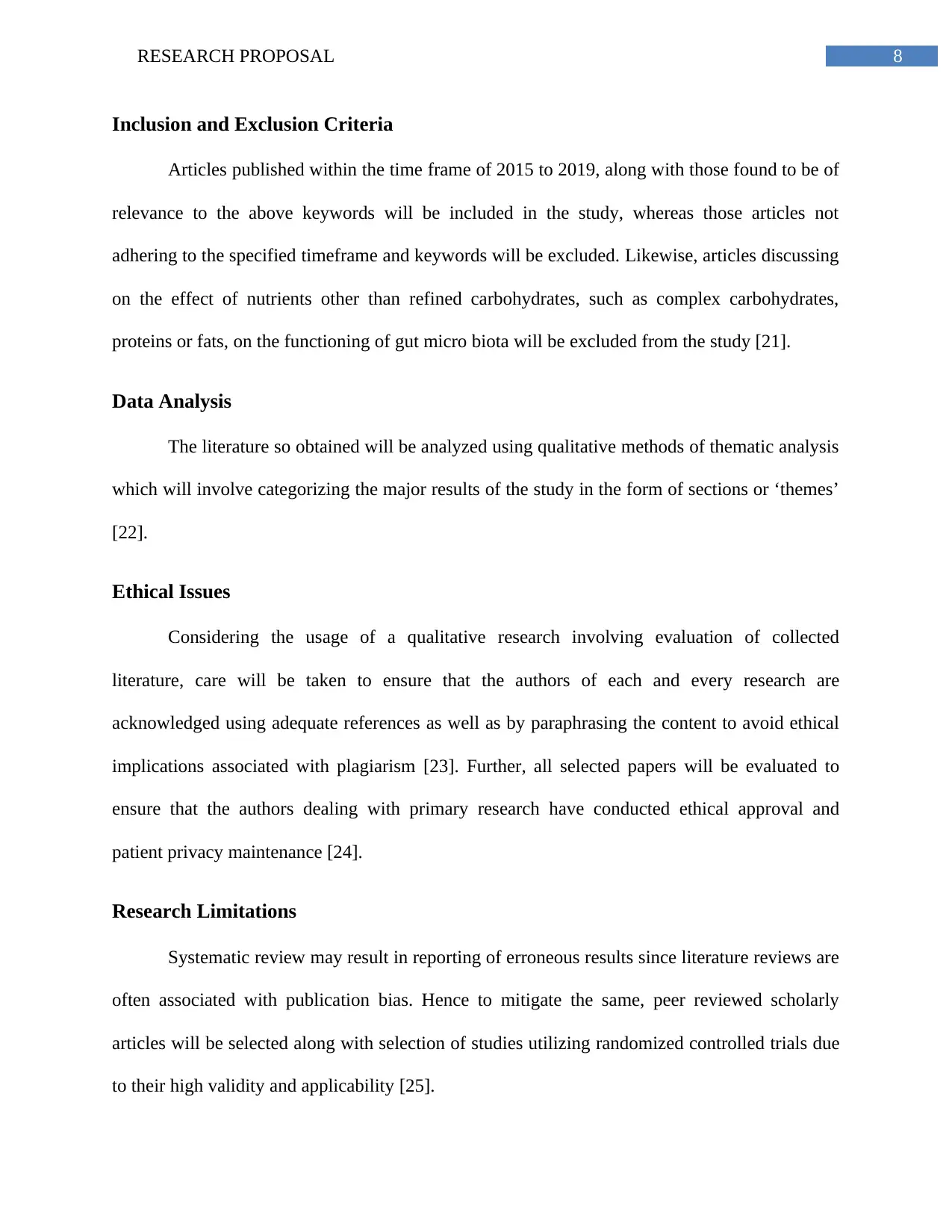
8RESEARCH PROPOSAL
Inclusion and Exclusion Criteria
Articles published within the time frame of 2015 to 2019, along with those found to be of
relevance to the above keywords will be included in the study, whereas those articles not
adhering to the specified timeframe and keywords will be excluded. Likewise, articles discussing
on the effect of nutrients other than refined carbohydrates, such as complex carbohydrates,
proteins or fats, on the functioning of gut micro biota will be excluded from the study [21].
Data Analysis
The literature so obtained will be analyzed using qualitative methods of thematic analysis
which will involve categorizing the major results of the study in the form of sections or ‘themes’
[22].
Ethical Issues
Considering the usage of a qualitative research involving evaluation of collected
literature, care will be taken to ensure that the authors of each and every research are
acknowledged using adequate references as well as by paraphrasing the content to avoid ethical
implications associated with plagiarism [23]. Further, all selected papers will be evaluated to
ensure that the authors dealing with primary research have conducted ethical approval and
patient privacy maintenance [24].
Research Limitations
Systematic review may result in reporting of erroneous results since literature reviews are
often associated with publication bias. Hence to mitigate the same, peer reviewed scholarly
articles will be selected along with selection of studies utilizing randomized controlled trials due
to their high validity and applicability [25].
Inclusion and Exclusion Criteria
Articles published within the time frame of 2015 to 2019, along with those found to be of
relevance to the above keywords will be included in the study, whereas those articles not
adhering to the specified timeframe and keywords will be excluded. Likewise, articles discussing
on the effect of nutrients other than refined carbohydrates, such as complex carbohydrates,
proteins or fats, on the functioning of gut micro biota will be excluded from the study [21].
Data Analysis
The literature so obtained will be analyzed using qualitative methods of thematic analysis
which will involve categorizing the major results of the study in the form of sections or ‘themes’
[22].
Ethical Issues
Considering the usage of a qualitative research involving evaluation of collected
literature, care will be taken to ensure that the authors of each and every research are
acknowledged using adequate references as well as by paraphrasing the content to avoid ethical
implications associated with plagiarism [23]. Further, all selected papers will be evaluated to
ensure that the authors dealing with primary research have conducted ethical approval and
patient privacy maintenance [24].
Research Limitations
Systematic review may result in reporting of erroneous results since literature reviews are
often associated with publication bias. Hence to mitigate the same, peer reviewed scholarly
articles will be selected along with selection of studies utilizing randomized controlled trials due
to their high validity and applicability [25].
⊘ This is a preview!⊘
Do you want full access?
Subscribe today to unlock all pages.

Trusted by 1+ million students worldwide
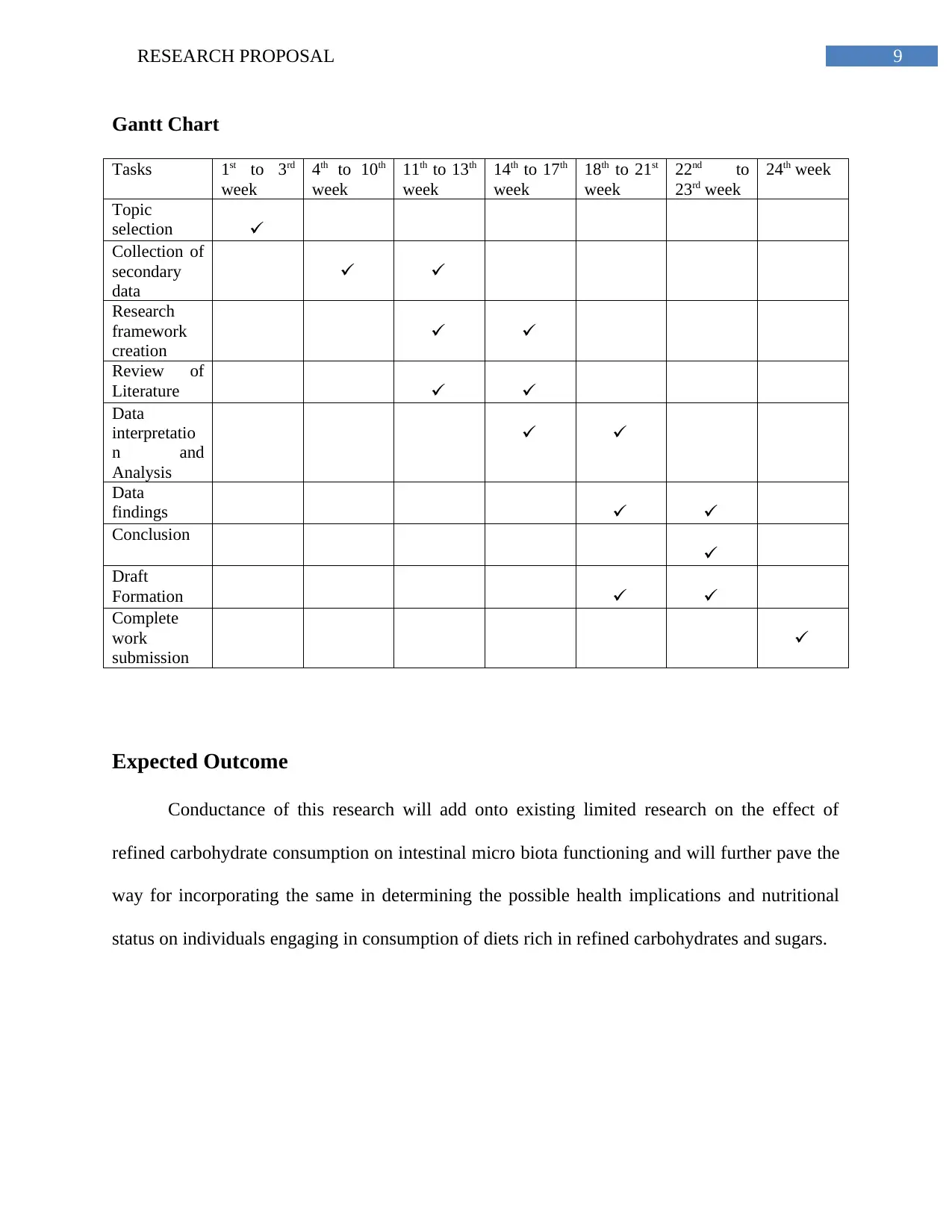
9RESEARCH PROPOSAL
Gantt Chart
Tasks 1st to 3rd
week
4th to 10th
week
11th to 13th
week
14th to 17th
week
18th to 21st
week
22nd to
23rd week
24th week
Topic
selection
Collection of
secondary
data
Research
framework
creation
Review of
Literature
Data
interpretatio
n and
Analysis
Data
findings
Conclusion
Draft
Formation
Complete
work
submission
Expected Outcome
Conductance of this research will add onto existing limited research on the effect of
refined carbohydrate consumption on intestinal micro biota functioning and will further pave the
way for incorporating the same in determining the possible health implications and nutritional
status on individuals engaging in consumption of diets rich in refined carbohydrates and sugars.
Gantt Chart
Tasks 1st to 3rd
week
4th to 10th
week
11th to 13th
week
14th to 17th
week
18th to 21st
week
22nd to
23rd week
24th week
Topic
selection
Collection of
secondary
data
Research
framework
creation
Review of
Literature
Data
interpretatio
n and
Analysis
Data
findings
Conclusion
Draft
Formation
Complete
work
submission
Expected Outcome
Conductance of this research will add onto existing limited research on the effect of
refined carbohydrate consumption on intestinal micro biota functioning and will further pave the
way for incorporating the same in determining the possible health implications and nutritional
status on individuals engaging in consumption of diets rich in refined carbohydrates and sugars.
Paraphrase This Document
Need a fresh take? Get an instant paraphrase of this document with our AI Paraphraser
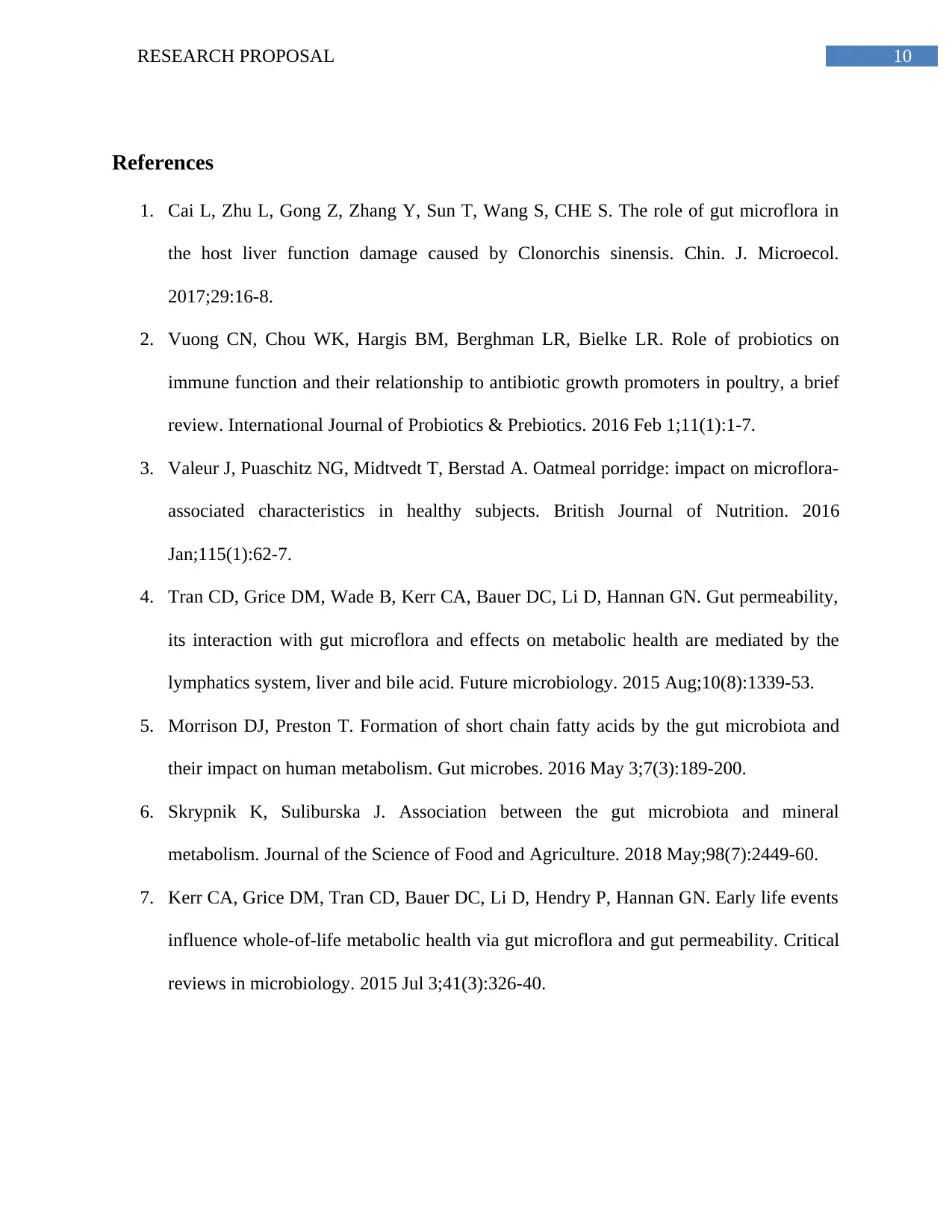
10RESEARCH PROPOSAL
References
1. Cai L, Zhu L, Gong Z, Zhang Y, Sun T, Wang S, CHE S. The role of gut microflora in
the host liver function damage caused by Clonorchis sinensis. Chin. J. Microecol.
2017;29:16-8.
2. Vuong CN, Chou WK, Hargis BM, Berghman LR, Bielke LR. Role of probiotics on
immune function and their relationship to antibiotic growth promoters in poultry, a brief
review. International Journal of Probiotics & Prebiotics. 2016 Feb 1;11(1):1-7.
3. Valeur J, Puaschitz NG, Midtvedt T, Berstad A. Oatmeal porridge: impact on microflora-
associated characteristics in healthy subjects. British Journal of Nutrition. 2016
Jan;115(1):62-7.
4. Tran CD, Grice DM, Wade B, Kerr CA, Bauer DC, Li D, Hannan GN. Gut permeability,
its interaction with gut microflora and effects on metabolic health are mediated by the
lymphatics system, liver and bile acid. Future microbiology. 2015 Aug;10(8):1339-53.
5. Morrison DJ, Preston T. Formation of short chain fatty acids by the gut microbiota and
their impact on human metabolism. Gut microbes. 2016 May 3;7(3):189-200.
6. Skrypnik K, Suliburska J. Association between the gut microbiota and mineral
metabolism. Journal of the Science of Food and Agriculture. 2018 May;98(7):2449-60.
7. Kerr CA, Grice DM, Tran CD, Bauer DC, Li D, Hendry P, Hannan GN. Early life events
influence whole-of-life metabolic health via gut microflora and gut permeability. Critical
reviews in microbiology. 2015 Jul 3;41(3):326-40.
References
1. Cai L, Zhu L, Gong Z, Zhang Y, Sun T, Wang S, CHE S. The role of gut microflora in
the host liver function damage caused by Clonorchis sinensis. Chin. J. Microecol.
2017;29:16-8.
2. Vuong CN, Chou WK, Hargis BM, Berghman LR, Bielke LR. Role of probiotics on
immune function and their relationship to antibiotic growth promoters in poultry, a brief
review. International Journal of Probiotics & Prebiotics. 2016 Feb 1;11(1):1-7.
3. Valeur J, Puaschitz NG, Midtvedt T, Berstad A. Oatmeal porridge: impact on microflora-
associated characteristics in healthy subjects. British Journal of Nutrition. 2016
Jan;115(1):62-7.
4. Tran CD, Grice DM, Wade B, Kerr CA, Bauer DC, Li D, Hannan GN. Gut permeability,
its interaction with gut microflora and effects on metabolic health are mediated by the
lymphatics system, liver and bile acid. Future microbiology. 2015 Aug;10(8):1339-53.
5. Morrison DJ, Preston T. Formation of short chain fatty acids by the gut microbiota and
their impact on human metabolism. Gut microbes. 2016 May 3;7(3):189-200.
6. Skrypnik K, Suliburska J. Association between the gut microbiota and mineral
metabolism. Journal of the Science of Food and Agriculture. 2018 May;98(7):2449-60.
7. Kerr CA, Grice DM, Tran CD, Bauer DC, Li D, Hendry P, Hannan GN. Early life events
influence whole-of-life metabolic health via gut microflora and gut permeability. Critical
reviews in microbiology. 2015 Jul 3;41(3):326-40.
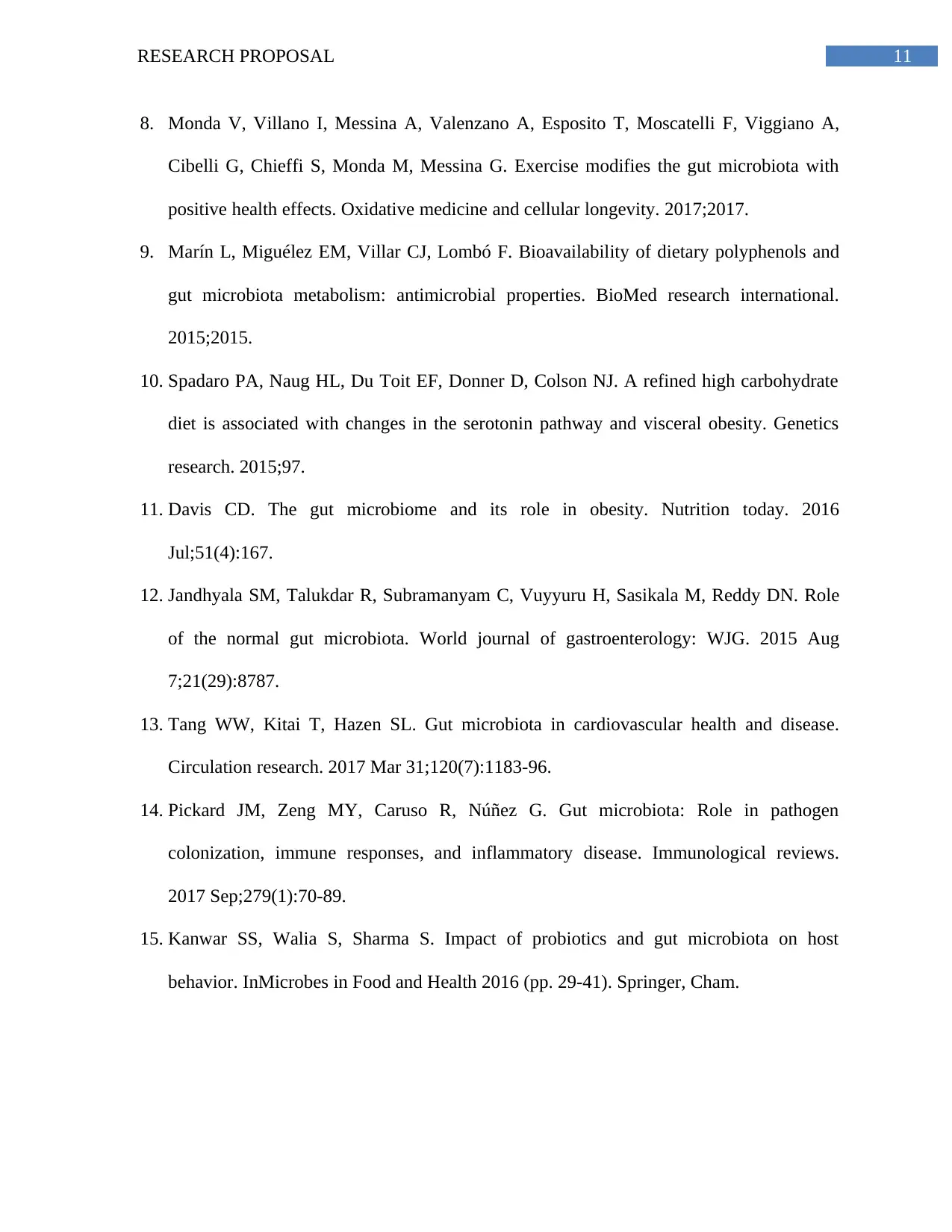
11RESEARCH PROPOSAL
8. Monda V, Villano I, Messina A, Valenzano A, Esposito T, Moscatelli F, Viggiano A,
Cibelli G, Chieffi S, Monda M, Messina G. Exercise modifies the gut microbiota with
positive health effects. Oxidative medicine and cellular longevity. 2017;2017.
9. Marín L, Miguélez EM, Villar CJ, Lombó F. Bioavailability of dietary polyphenols and
gut microbiota metabolism: antimicrobial properties. BioMed research international.
2015;2015.
10. Spadaro PA, Naug HL, Du Toit EF, Donner D, Colson NJ. A refined high carbohydrate
diet is associated with changes in the serotonin pathway and visceral obesity. Genetics
research. 2015;97.
11. Davis CD. The gut microbiome and its role in obesity. Nutrition today. 2016
Jul;51(4):167.
12. Jandhyala SM, Talukdar R, Subramanyam C, Vuyyuru H, Sasikala M, Reddy DN. Role
of the normal gut microbiota. World journal of gastroenterology: WJG. 2015 Aug
7;21(29):8787.
13. Tang WW, Kitai T, Hazen SL. Gut microbiota in cardiovascular health and disease.
Circulation research. 2017 Mar 31;120(7):1183-96.
14. Pickard JM, Zeng MY, Caruso R, Núñez G. Gut microbiota: Role in pathogen
colonization, immune responses, and inflammatory disease. Immunological reviews.
2017 Sep;279(1):70-89.
15. Kanwar SS, Walia S, Sharma S. Impact of probiotics and gut microbiota on host
behavior. InMicrobes in Food and Health 2016 (pp. 29-41). Springer, Cham.
8. Monda V, Villano I, Messina A, Valenzano A, Esposito T, Moscatelli F, Viggiano A,
Cibelli G, Chieffi S, Monda M, Messina G. Exercise modifies the gut microbiota with
positive health effects. Oxidative medicine and cellular longevity. 2017;2017.
9. Marín L, Miguélez EM, Villar CJ, Lombó F. Bioavailability of dietary polyphenols and
gut microbiota metabolism: antimicrobial properties. BioMed research international.
2015;2015.
10. Spadaro PA, Naug HL, Du Toit EF, Donner D, Colson NJ. A refined high carbohydrate
diet is associated with changes in the serotonin pathway and visceral obesity. Genetics
research. 2015;97.
11. Davis CD. The gut microbiome and its role in obesity. Nutrition today. 2016
Jul;51(4):167.
12. Jandhyala SM, Talukdar R, Subramanyam C, Vuyyuru H, Sasikala M, Reddy DN. Role
of the normal gut microbiota. World journal of gastroenterology: WJG. 2015 Aug
7;21(29):8787.
13. Tang WW, Kitai T, Hazen SL. Gut microbiota in cardiovascular health and disease.
Circulation research. 2017 Mar 31;120(7):1183-96.
14. Pickard JM, Zeng MY, Caruso R, Núñez G. Gut microbiota: Role in pathogen
colonization, immune responses, and inflammatory disease. Immunological reviews.
2017 Sep;279(1):70-89.
15. Kanwar SS, Walia S, Sharma S. Impact of probiotics and gut microbiota on host
behavior. InMicrobes in Food and Health 2016 (pp. 29-41). Springer, Cham.
⊘ This is a preview!⊘
Do you want full access?
Subscribe today to unlock all pages.

Trusted by 1+ million students worldwide
1 out of 14
Related Documents
Your All-in-One AI-Powered Toolkit for Academic Success.
+13062052269
info@desklib.com
Available 24*7 on WhatsApp / Email
![[object Object]](/_next/static/media/star-bottom.7253800d.svg)
Unlock your academic potential
Copyright © 2020–2026 A2Z Services. All Rights Reserved. Developed and managed by ZUCOL.



